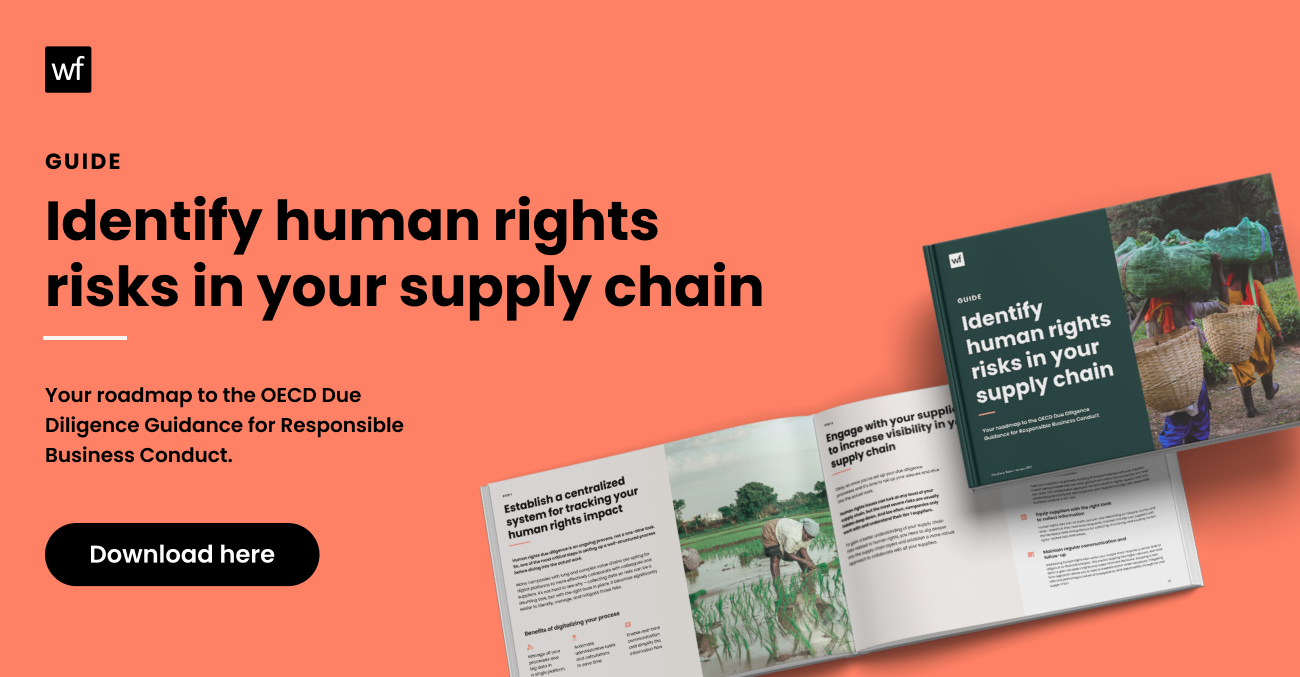Why is Human Rights Due Diligence important for businesses?
In this blog, we will look into why human rights due diligence is important for companies, and how to effectively set up your own due diligence process.
Learn how to detect human rights risks in your supply chain and comply with the OECD Human Rights Due Diligence Guidelines in our step-by-step guide:

Mandatory Human Rights Due Diligence (HRDD) requirements for businesses has boomed all across the world in the past few years. Several countries, such as France, the Netherlands, Germany, and Norway have enacted their own national HRDD laws, and similar prospects have been discussed in Austria, Belgium, Luxembourg. Similarly, the European Commission announced in 2021 that they would adopt their own directive on mandatory supply chain due diligence for all companies operating within the EU – which will most likely enter into force already in 2024. One thing is certain: if companies want to flourish, or even survive in the future market, establishing a human rights due diligence process that meets the legal requirements is a must!
What is Human rights due diligence?
Human rights due diligence is a risk management tool that businesses undertake to identify, respond, mitigate and prevent its adverse human rights impacts in their own operations and supply chains.
Why is Human Rights Due Diligence important?
The growing demand for companies to undertake an HRDD procedure is nothing any company can afford to turn a blind eye to – regardless of whether they’re legally required to do so or not. Companies affected by legislation must ensure to comply as they otherwise might face the risk of injunction or fines, while others should comply to keep up with the competition. Not to mention the risk of reputational damage as customers’ and investors’ demands on companies are rising.
The OECD Due diligence guidelines
Most of the existing and forthcoming HRDD laws, such as the Norwegian Transparency Act (Åpenhetsloven), Germany´s Supply Chain Due Diligence Act (LkSG), and the French Duty of Vigilance Act, are referencing the OECD Due Diligence Guidance for Responsible Business Conduct as the procedure to follow. It is an internationally recognized standard for how companies should perform due diligence within their own operations and supply chains. By aligning your HRDD process with the OECD Due diligence guidelines, you can ensure that your process complies with the majority of new and existing human rights due diligence laws.
An OECD Human Rights Due Diligence checklist for companies:
1. Develop, implement, and communicate a policy on human rights due diligence
2. Develop a process to assess and identify the most significant risks within operations, supplier, and business relationships
3. Take action on the most significant risks & develop a remediation plan to cease, prevent and mitigate risks
4. Track the implementation and results to evaluate the effectiveness of due diligence procedures
5. Communicate human rights due diligence procedures, risks, activities and findings to stakeholders
6. Cooperate with other parties to enable remedy
The Challenge: How to carry out a risk assessment according to the OECD due diligence guidelines?
Risk management is not an easy task and too often – this results in companies assessing risks infrequently or only after a big risk event has occurred. One of the main concerns coined in Research Handbook on Human Rights and Business is that “HRDD may become just another checkbox procedure that is incorporated as a cost of doing business – with human rights violations as quantifiable collateral damage”. Today, most companies’ challenge lies in how to monitor risks at scale both time and cost-efficiently, while ensuring full compliance with legal requirements of established HRDD frameworks.
To comply with the OECD Human Rights Due Diligence guidelines, companies must develop an ongoing process that assesses and identifies the most significant and potential risks of their operations, suppliers, and business partners. However, managing the tremendous volume of data needed usually requires a lot of resources and time, making the procedure complex and dreadful for companies.
The solution: Set up your Human Rights risk assessment in Worldfavor
Automate your risk assessment process in Worldfavor to monitor risks more efficiently, accurately, and faster. Automatically allocate data from your suppliers and benchmark your progress to the OECD guidelines. Don’t let your human rights due diligence end up as another checkbox procedure. Collect, analyze, and break down your organization's performance easily and get actionable insights that makes a true difference. Check out how to set up your human rights due diligence in Worldfavor here, or contact us today for a free, customized demo.
Related blog posts you might like:







%20as%20the%20deadline%20approaches.%20Learn%20about%20compliance%20requirements%2c%20potential%20delays%2c%20and%20key%20updates..png)

